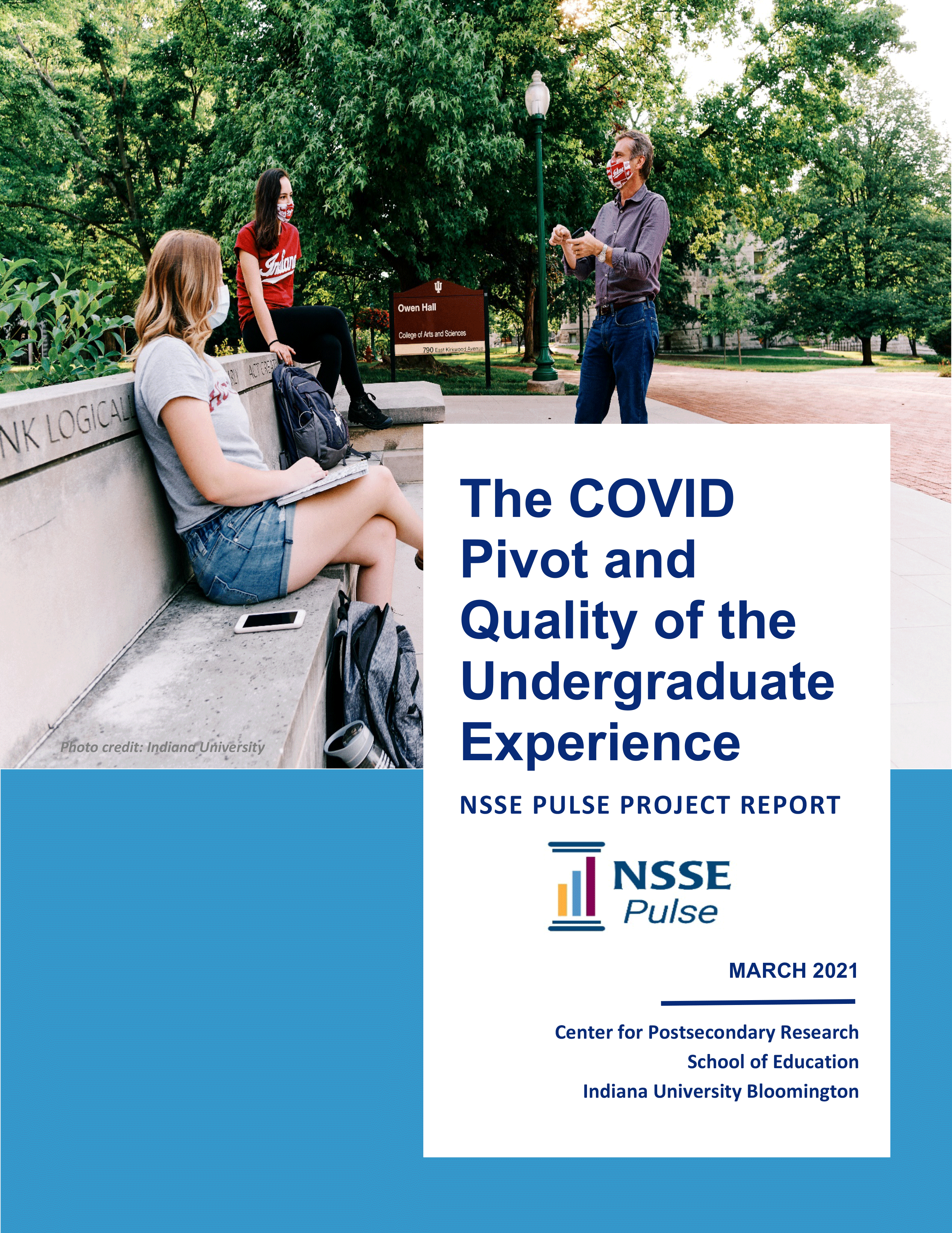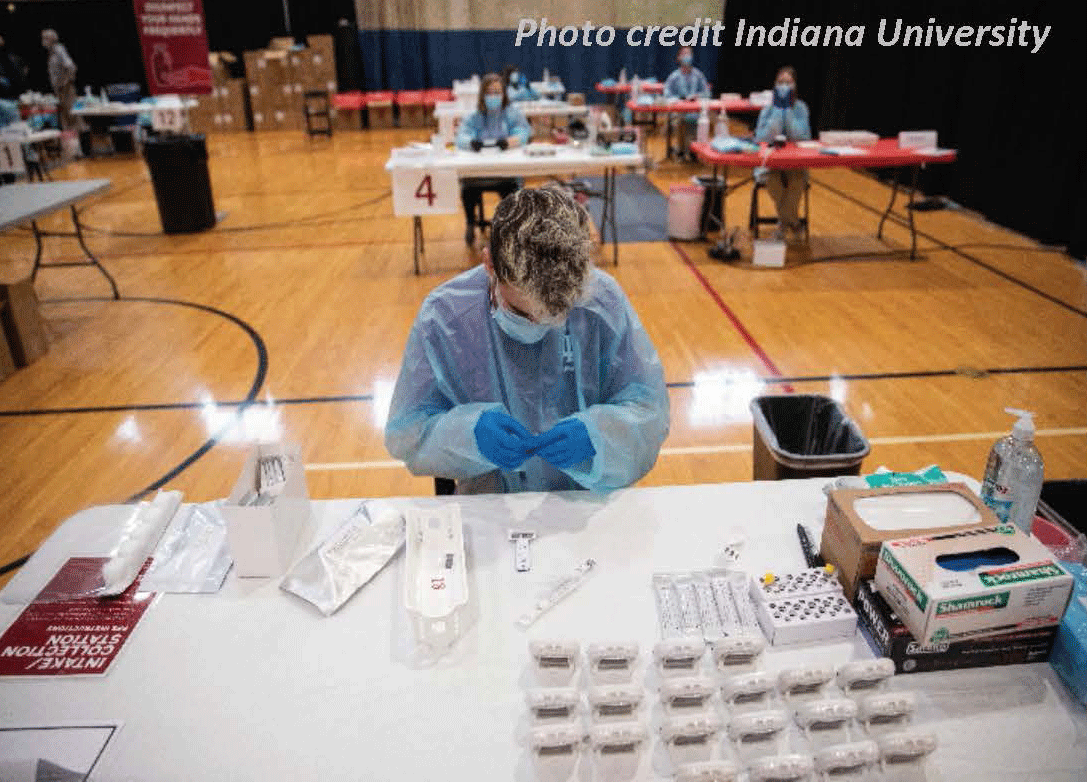1. What is the cost of participating in NSSE Pulse?
NSSE is offering a special fall survey at no charge (NSSE 2021 registration not required) as a response to the global pandemic and these unprecedented times.
2. What are the open and close dates for NSSE Pulse?
Registration is open and closes on October 12, so register today! The survey can be administered between October 5 and November 23.
3. The survey has launched (it’s after October 5); can we still participate?
Yes, NSSE Pulse registration is open until October 12; register here or email us at NPulse@iu.edu
4. Our institution would like to participate in NSSE Pulse in the Spring 2021?
NSSE Pulse is intended to provide institutions an assessment during the first term of the academic year. If your institution is interested in a spring survey, please consider participating in the standard NSSE administration; visit the NSSE registration page or contact your Project Services team for more details.
NSSE may offer Pulse in the Spring 2021 on a minimal, cost recovery basis, so stay tuned to our news feed for future details of NSSE Pulse.
5. Is it possible to modify (add, remove, or change) questions on NSSE Pulse?
NSSE Pulse does not allow for item modification, so questions cannot be added, removed, or changed.
However, given that recruitment for NSSE Pulse is managed by your institution (considered a local administration) and your institution controls recruitment content, you could include an additional link in the recruitment message to other surveys. While this process may seem cumbersome at first, it would be a great way to streamline multiple invitations to your students.
6. How much time does NSSE Pulse take for students to answer?
NSSE Pulse is short and to the point; estimated completion time is only 3 minutes.
7.Can we offer our students incentives to participate in NSSE Pulse?
Incentives are not permitted due to the brevity of the survey. However, we expect students will be eager to share what they are experiencing.
8. We would like to follow up NSSE Pulse with questions in the spring term. Will NSSE Pulse be available then?
NSSE Pulse is designed to assess student learning and campus environment during the first term of the academic year. To follow up during the spring 2021 term, NSSE is adding two, optional Topical Modules as part of the standard NSSE administration. The first module “Coping with COVID-19” directly assesses the impact of the pandemic. The second module “Experiences with Online Learning” assesses various aspects of what experts consider to be the ideal structure for online and hybrid courses. For more detail on either of these modules visit, https://nsse.indiana.edu/nsse/survey-instruments/topical-modules/.
While both Topical Modules and NSSE Pulse are stand alone, “Coping with COVID-19” is a good and expanded follow-up to NSSE Pulse. You can register today for the spring NSSE 2021 here. Additionally stay tuned to our news feed for future details of NSSE Pulse.
9. Who can take NSSE Pulse survey, can our institution include transfer students, sophomores and juniors (2nd and 3rd year), or even graduate students?
NSSE Pulse is designed to be administered to all undergraduate learners. However, if you deem the questions relevant to your graduate students you may invite these students to respond. Ultimately, participating institutions control the population surveyed.
10. When will data be made available and will it include benchmarking with other institutions?
Data will be delivered via a CSV file approximately one week after the survey closes. Comparative data for benchmarking will be available in November. We plan to offer broad comparison groups based on institutional type and by instructional delivery modes.
11. How will institutional comparisons be made and will institutions be identifiable?
A list of participating institutions will be available online after the survey launches; however, individual institutions are never identified or ranked in any NSSE reports. Institutional results are held in strict confidence and are never shared. Any comparisons made will be by broad institution types and only in aggregate (i.e. public institutions). Comparison groups will not be customizable, so specific institutional comparisons cannot not be made. NSSE Pulse is intended to help institutions broadly contextualize their student responses.
12. Is NSSE Pulse suitable for our specific mode of course delivery (in-person, online, or hybrid)?
Yes, NSSE Pulse was designed for all modes of delivery including in-person, online, and hybrid models.
13. Does our institution need research or regulatory approval before we administer the survey?
We cannot speak to the needs at your local institution as many institutions do not review or approve assessment or quality assurance projects. At NSSE, our surveys undergo regulatory review to assure the protection of all participants. The Indiana University IRB granted an exemption to this research project under protocol 2009721954.
We at NSSE are committed to maintaining protections for participants during recruitment and through the study process. For us, this commitment includes a dedication to ensuring institutional results are held in strict confidence.
14. What are the main differences between the standard NSSE administration and NSSE Pulse?
Standard NSSE | NSSE PULSE |
First-year and Senior only | All students are eligible including graduate students if you deem appropriate |
Census population file required | No population file is required |
Recruitment standardized (survey invitation and reminders) and managed by NSSE | Recruitment managed by the institution |
Links to students are individual/unique, so students are identifiable | Links to institution are standard so students are anonymous as they are not individually identifiable |




